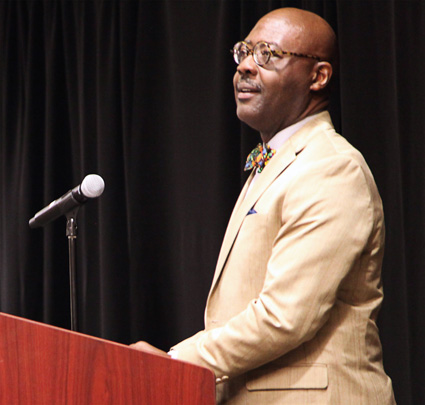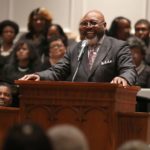BROWNWOOD—American Christians risk embracing racial faith without even being aware of it, noted Willie James Jennings, associate professor of theology and black church studies at Duke University Divinity School.
 Willie James Jennings, associate professor of theology and black church studies at Duke University Divinity School, speaking at Howard Payne University. (HPU Photo)“The American story is a story of the entanglements of race and Christian faith. We are yet to fully comprehend how deeply and thickly race and Christian faith are woven inside each other in the Western world,” said Jennings, who delivered Howard Payne University’s Currie-Strickland Distinguished Lectures in Christian Ethics.
Willie James Jennings, associate professor of theology and black church studies at Duke University Divinity School, speaking at Howard Payne University. (HPU Photo)“The American story is a story of the entanglements of race and Christian faith. We are yet to fully comprehend how deeply and thickly race and Christian faith are woven inside each other in the Western world,” said Jennings, who delivered Howard Payne University’s Currie-Strickland Distinguished Lectures in Christian Ethics.
Americans often make the mistake of treating racism as a virus attacking the body, rather than recognizing it as “a constituting reality of our social body,” he said.
“The reason our racial struggles in this country and the West are so intractable, stubbornly yelling at us in the face year after year, is because we refuse to see how deeply their roots are embedded in the ways we think, live and imagine our world socially,” Jennings said.
Race in America is a ‘form of religious faith’
“Race in America is a form of religious faith, and we will never be able to understand or address it with the necessary knowledge, energy or commitment until we comprehend its true religious architecture. Race has a Christian architecture, and Christianity in the West has a racial architecture.”
For real change to occur, Christians must exchange a counterfeit racial faith for a true faith in Jesus Christ, Jennings asserted. However, they must recognize how interwoven the two strains have become over centuries.
“Racial faith weaves itself inside our prayers, our worship, and our hopes and dreams as a people. It is intensely a matter of faith, because it is tied to the way people see and want to be seen and their aspirations of who they might become in this world,” he said.
Christians forgot they were Gentiles
Sign up for our weekly edition and get all our headlines in your inbox on Thursdays
The problem emerged when Christians forgot they were Gentiles—people outside God’s covenant relationship with the Jews, he noted.
“We have forgotten the beautiful journey of becoming that is Christianity—the journey of the Gentile,” Jennings said. “We have forgotten what it means to see life from those on the outside who have been included by grace, and consequently, we have lost the sense of inclusion as a life calling and a way of life.
“We have lost the sense that we are to include others who are at the margin as fundamental to our way of life. This has affected the way we read the Bible, and because it has affected the way we read the Bible, it has deeply impacted the way we treat others. We imagine ourselves at the center and others at the margin.”
European Christians grew to see “whiteness” as the ideal in terms of aesthetics, theology and morality, he noted. As a result, “whiteness” gained power.
“Whiteness was and is a way of being in the world and a way of seeing the world at the same time,” he asserted. “It was nurtured and grew inside of Christianity. It is a voice mimicking Christianity, saying sweetly, ‘This is what it means to be Christian.’
“But now we know whiteness is not a given; it is a choice. Whiteness is not the equal and opposite of blackness, it is not one racial flavor next to another. Whiteness is a way of imagining the world moving around you, flowing around your body with you at the center.
“Whiteness is a way of imagining the true, the good and the beautiful configured around my body. Whiteness is a way of imagining oneself as the central facilitating reality of the world—the reality that makes sense of the world, interprets, organizes and narrates the world. Whiteness is having the power to sustain that imagination.”
Racial ‘faith’ and European colonialism
Western Christians in the 21st century also need to recognize how racial faith grew out of European colonialism, Jennings asserted.
“It grew in those spaces where Christians from the Old World came to the New World and realized their unprecedented power over indigenous peoples and land. This was power like they had never seen or experienced. Such power deeply infected and influenced the way Christians looked out onto indigenous peoples,” he said.
Since European Christians considered themselves the “bearers of the faith,” it affected their interaction with the indigenous population, he said. They felt they were “destined by God to be the teachers of the world,” Jennings said.
“Teaching is at the heart of the Christian faith, but it is not the first thing. The first thing is being a learner. We are those who joined the story of another people, Israel—and in this way learned of our God. It is the joining another as learner that is central to our faith—authentic faith,” he said.
European Christians had no sense of learning alongside the people they found living in the New World. They were simply teachers, not learners, Jennings said.
“This missionary impulse of instruction is not a problem, but placed within a constellation of dominating effects like stealing the land, enslaving the native people, the destruction of their holy places and the wholesale killing of indigenous animals, all of these things helped to create the most insidious aspect of racial faith,” he said.
“For the settlers, the natives are pagans either captured in demonic influence or simply ignorant and in need of guidance in the more excellent ways of God. … These settler Christians took a biblical framework, turned it upside down and inside out, and looked out onto their world in a terribly sick way.”
European settlers saw native people not as “those loved by God but demonically oppressed and culturally deficient,” Jennings said.
Jesus’ learning and teaching
This is not the example Jesus set, he insisted. Jesus became human to learn of humanity and engage in culture. After learning the culture, he then taught.
“His teaching is embedded in his learning. He has learned the wisdom of his people and from that well of wisdom, he teaches the way of God. We often bypass the reality of his shared wisdom, preferring to see his words falling only from heaven,” he said.
Because of this, Christians often miss the necessity of being a learner when making disciples, Jennings said.
“We have preferred to impose theological knowledge, denigrate the indigenous knowledge and present a God who knows everything and wants to know nothing—which means we are presented a Christianity that knows everything and wants to know nothing because the Christian God is not found in the learning, only in the teaching,” he said.
“This way of thinking is counter to the reality of Christian faith. We Gentiles entered into Israel’s story wishing to learn of our God by learning of a different people. We entered the story of Israel learning. And this was the work of God.
“So, too, the disciples of Jesus were pressed by the Spirit to join other peoples, learning their ways, understanding their lives and in this way to follow where God was leading. But this way of making disciples was lost, and in its place an imperial Christianity that imagined its only true form in the teaching.
‘Pedagogical imperialism’
“This is what I am terming ‘pedagogical imperialism,’ which turned the entire world outside the colonial West into perpetual students, and those in the West, us, as eternal teachers.
“We have to put at our feet the arrogance of a nation that imagines it is the teacher of the world. We gave birth to that because we offered a kind of modern Christianity that is not open to learning, not open to change, not open to adapting, but instead assimilates people or segregates people into their own versions of Christianity.”















We seek to connect God’s story and God’s people around the world. To learn more about God’s story, click here.
Send comments and feedback to Eric Black, our editor. For comments to be published, please specify “letter to the editor.” Maximum length for publication is 300 words.